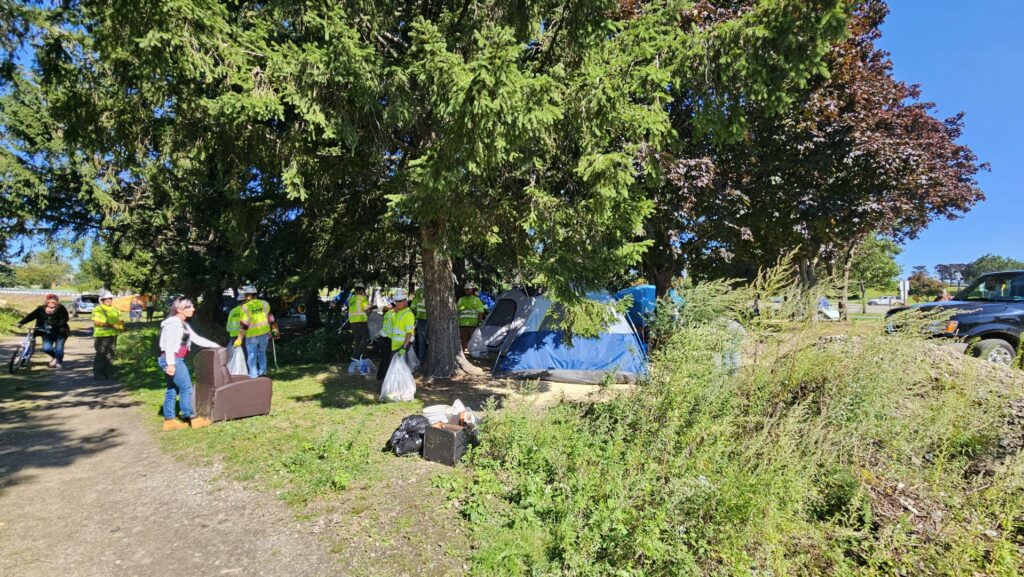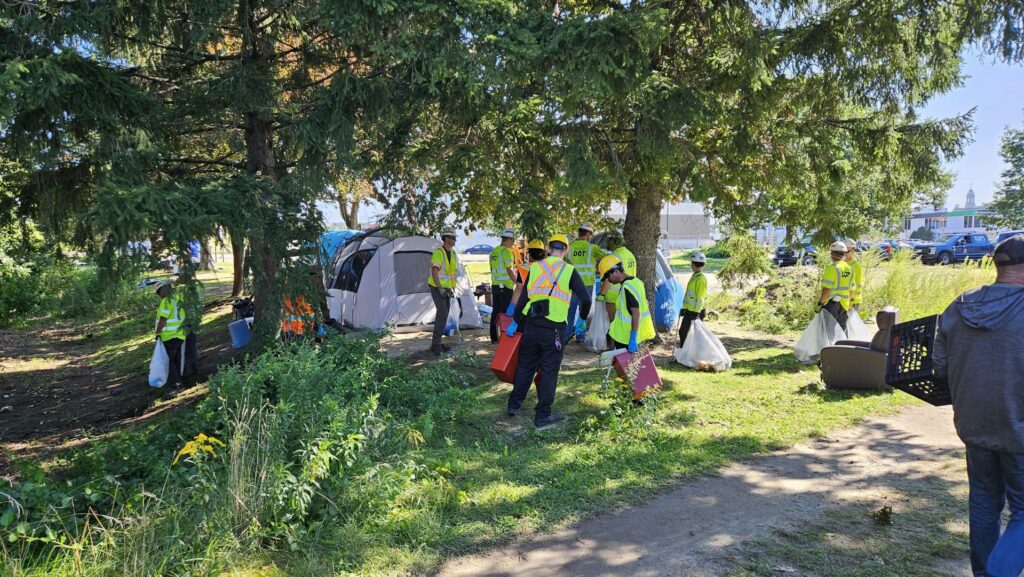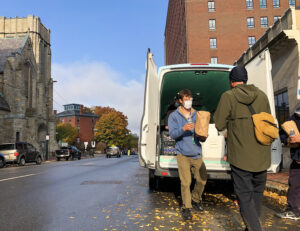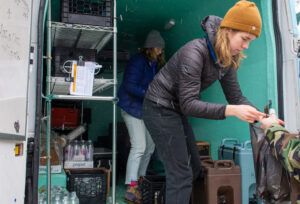Preble Street calls for a postponement of the September 6 sweep of the Fore River encampment to allow more time for outreach staff to find shelter and housing for the people staying there. For the safety of all, we must focus on increasing the resources available to people staying in encampments including the number of available shelter beds.
When attempting to solve a problem, you define it and determine the causes. Then you identify and examine the potential solutions, looking at the benefits and consequences of each. Finally, you implement a solution.
Just this past spring, the homeless encampment of more than 80 tents alongside the Bayside Trail was swept by the City of Portland, forcing all the people staying there to move to other areas of the city. As is always the case with encampment sweeps, these individuals lost belongings imperative to their survival and wellbeing, including tents, and personal effects, and faced even more dire medical and life-threatening aftereffects from the forced move. Since this sweep, the number of tents across the City of Portland has only increased and spread into different neighborhoods.
With today’s sweep off of Forest Avenue and the upcoming September 6 ‘resolving’ of the Fore River encampment, do sweeps like this get us closer to solving homelessness, decreasing the number of tents and encampments in our community, and ensuring safe and dignified shelter for everyone? We don’t think so.


Maine Department of Transportation swept the Deering Oaks encampment on August 31, 2023 where dozens of people experiencing homelessness were staying
The issue: More than 220 tents, some with multiple people living in them, are in public areas of Portland. Living outside, these people have little to no support or access to the key basic needs that most of us take for granted, like clean drinking water or a toilet.
The causes: Emergency shelters in Portland and across the state have full beds every night. Even for the many people with a job or a housing voucher, there is no affordable housing to be found. For far too many people here there is simply nowhere to go, nowhere to stay.
There is a false narrative being spread through unsigned letters to comments on social media to letters to the editor that individuals at the encampments are refusing services. There are many reasons that people might not be ‘ready to accept an offer of housing or shelter’ even if we had shelter beds and affordable housing available. It’s much easier to blame people for supposedly not accessing “available services” than it is to examine whether or not those services offered are the right ones, are delivered well, and are truly accessible from the client’s point of view.
- It’s hard to leave a partner, spouse, or friends when only one person is offered a bed
- Congregate settings can bring back memories of incarceration or other institutional experiences
- Pets aren’t allowed in shelters
- Barriers in place at shelters
- Available shelter may be too far from other needed resources
- Fear of violence or theft
The unprecedented homelessness that we see today is a result of the systems and structures that exist throughout society. Intergenerational poverty and health and wealth disparities; structural racism & the continued impact of White Supremacy; gentrification; a lack of investment into social services; and the lingering impacts from COVID-19 are just a few of the causes.
Finding solutions: To address the homelessness crisis in Maine, we must bring to the table an understanding of the many reasons that people become homeless, how difficult life is when you are unsheltered, that escaping homelessness is rarely simple, and most importantly, how the solutions that we put in place must be delivered with compassion. The solutions that we develop must be able to serve all who need assistance — from homeless youth seeking safety to asylum-seekers coming to Maine to people struggling with substance use disorder or behavioral health problems to the baby boomers who can’t make ends meet.
Each tent is a visual, and heartbreaking, representation of the lack of shelter beds in Maine. Shelters play an absolutely critical role in solving homelessness and in keeping communities safe. But across Maine, and other states, shelters are constantly struggling to keep doors open and people safe.
Governor Mills’ change package, signed into law in July 2023, provides emergency support to address Maine’s shelter and housing crisis, including funding for shelters, Site-based Housing First, and affordable housing. It is a positive step forward to address the need for investment in emergency shelters, a critical resource to ensure the public health of our communities. Building on these types of initiatives is the action that we need to address homelessness in our communities.
We are continuing to work with the City and other social service providers to support people living at the encampment in finding housing or shelter. Preble Street has been active on the Encampment Crisis Response Team’s (ECRT) Basic Needs, Health Services, Mobile Engagement Center, Housing Resources, and Case Conferences Committees. There has been a lot of positive work done through the ECRT and we believe that more progress can come – with patience and time. As a Preble Street social worker shares, “It’s really frustrating when a false hope is given to this community. It breaks the trust which takes years to earn and minutes to lose.”
That trust goes hand in hand with outreach and resources. Outreach – supported by intensive case management which helps to connect people with shelter, housing, health services, IDs, clothing, and more – is the key ingredient that helps people reach their goals. This outreach must be supported by resources – from increasing the number of staff providing the outreach (social service agencies are struggling, like so many businesses and nonprofits to fill positions; Preble Street has numerous opportunities for employment available that we are trying to fill) to resources that help people meet their basic needs like access to clean water, bathrooms, and food to programs that can help people address substance use, medical, domestic violence, or other issues that prevent them from successfully accessing housing and shelter.
“The pain and the suffering that happens when people are forced to sleep outside is awful,” Donna Yellen shared with the Portland Press Herald. And when homeless people are forced out of an encampment, it only adds to their stress. “Sweeping an encampment is traumatizing and it is harmful.”
Preble Street is extremely concerned about this upcoming sweep of the Fore River encampment and its impact on our most vulnerable citizens. We continue to advocate to the City for its postponement. If you are a Portland resident, we ask that you also reach out to Portland City Councilors and City officials to ask them to postpone the September 6 sweep and give the work that is being done more time to take effect and achieve the results we all want to see – more people in safe shelter and housing.
Learn more

It starts with a meal, or a clean pair of socks
Three years ago this month, in response to the dangers and restrictions posed by the COVID-19 pandemic, Preble Street reimagined the way we provide meals and casework to people experiencing homelessness, and the Street Outreach Collaborative (SOC) was born. Revisit the 2020 PBS Newshour story about these changes:“Mobile outreach: A lifeline during COVID-19” No longer

Unsheltered homelessness: No simple answers
The chalk writing on the doors near the Bayside Trail says, “I’m so ignorant to think we’d make it out of this thing TOGETHER…or alive.” The hearts surrounding the message give hope, but the ‘or alive’ just scratches the surface of the despair we all feel knowing that there is no ready, short-term solution for

Addressing unsheltered homelessness in Maine
No one should have to live outside, but that is what is happening to an unprecedented number of Mainers right now. In Portland, the Parks Department recently counted 102 tents set up by people experiencing homelessness — a new record for the area. The encampment on the Bayside Trail is a visual representation of the fact

